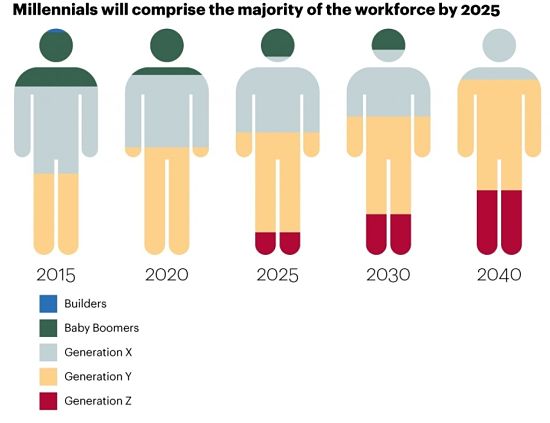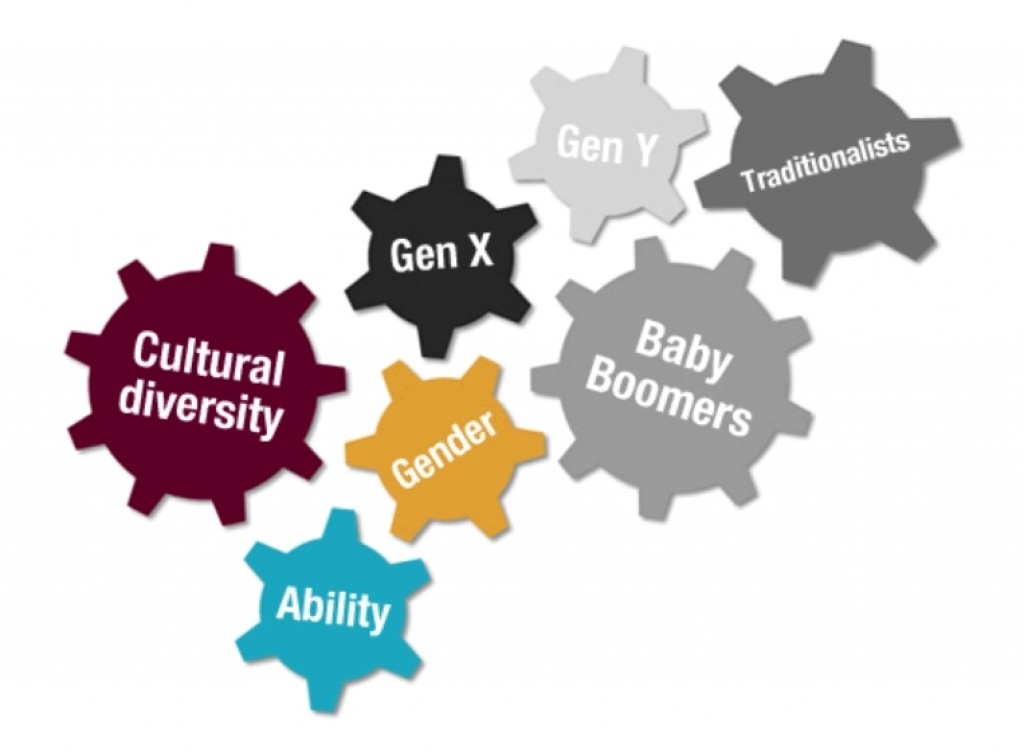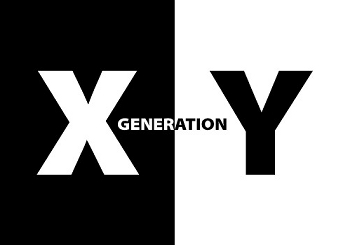Motivating, Managing, Retaining Generation X and Gen Y, Z Employees
Generalization is a dangerous practice at the best of times and can be misleading as we tend to assign everyone we meet to a group and to regard them as the same. Generalization about generations and their common features is part of the modern world. The generalizations primarily relate to the economic, social, educational and cultural differences between various age groups and how they have been affected by technology, the economy and cultural changes.
Due to the delayed retirement of the Baby Boomers and the earlier development and entry of young people into the workforce into middle management positions, senior management may have to deal with 4 or 5 generations in their work teams. Some generalisations, and recognition of their differences, is required to manage these diverse staff and to satisfy their requirements, to get the best from them and to retain them.
Fitting X, Y, Z into BUSINESS






Do The Generation Categories Matter in Business?



More than 60% of employers have recently reported in a survey conducted by Lee Hecht Harrison said that have experienced tension between employees from different generations. Other surveys have found more than 70% of older staff have low opinions about younger workers' abilities. Also about 50% of employers say that younger employees have poor opinions about the abilities of their older colleagues.
What are the features of these Generations?
The term Generation X was first used in the novel Generation X: Tales for an Accelerated Culture ((1991) by Douglas Coupland. Since then various other generations have been recognised including the 'Baby Boomers', Generation X, Y and Z (see details below). The term Generation Y first appeared in an August 1993 Ad Age editorial to describe the attitudes of the teenage generation then aged 13–19 (born 1974-1980), which they recognised as separate from Generation X. In their book Millennials Rising: The Next Great Generation (2000), William Strauss and Neil Howe use the start year as 1982 to describe the Millennials generation.
There is an ongoing debate about whether the generalisations about the differences between these different age groups are simply related to their age differences or reflect real variations in their culture, education, upbringing and environment. These comparisons are probably not new as the younger generation in every society will reflect the changes in the society, the culture and the environment. All of us are the product of our genetics and our environment. As human beings that devote 3-12 years or more to education, we are always going to be profoundly affected by this education of the society in which we develop.
A general description of the birthdays for the various generations is:
- Depression Era, born 1912 to 1921, came of age 1930 to 1939
- The Builders - World War II veterans, born 1922 to 1927, came of age 1940 to 1945
- Post-War Cohort, born 1928 to 1945, came of age 1946 to 1963
- Baby Boomers - 1946 to 1964 came of age 1964 to 1982
- Generation X - 1965 to 1979 came of age 1983 to 1997
- Generation Y, Echo Boomers or Millenniums 1980 to 1995 came of age 1998 to 2013
- Generation Z 1996 to about 2025 came of age 2014 to about 2043
Some of the arguments for and against the common traits of various generations and age groups are:
► The differences between generations are more related to age and education and all groups are not static and are exposed to the same influences. This means that the differences they show fade with time. You see more 50-year-olds texting, and more people becoming comfortable with open, online identities and social bookmaking and online social communication. Each generation benefits from the innovation of the previous ones.
► Generation X and Y have benefited from and adapted to the internet, mobile phones which were invented by previous generations. This process has occurred in the past with the invention of the telephone, personal computers and personal transport such as cars and motorbikes which caused major changes in our culture.
► Each group can benefit from the changes produced by an earlier group. Many have argued that Generation X enabled Generation Y to be bolder, by removing many of the traditional barriers to success. Generation Y were never confronted by the barrier and were not impeded by it and this contributed to the rapid increase and development of technology. Generation Y were younger and these new technologies were part of their education and so they were able to pick it up quicker and run with it.
► Generation X was a label developed by the baby boomers to describe the wild views and attitude of new generation who had escaped the war experiences. The young people were so much better off than their parents whose thinking had been clouded by the threat of war and nuclear annihilation and the flower-power generation of the hippies during the 1960s. The baby boomer generation was responsible for breaking most of the norms in the 1960s. New freedoms, attitudes and opportunities were picked up and further developed by Generation X, which in turn broke more of the norms in the 1990s, which benefited Generation Y is enjoying and further developing.
► There is a sense in which the differences between the generations is simply a reflection of the idealism of youth clothed in cultural and technological differences. Most people and every generation starts with the idealism of youth and shifts as they get older and more experienced into realism, cynicism, and the confinement of practicality as they get older. The Baby Boomers and Hippies who were going to change the world with peace, love and understanding. Generation X became the IT crowd are sought to change the world with the Internet and mobile phones. Generation Y is changing the way we communicate with social networking and the way we do business though the world-world Web. Each generation has also been conditioned by the economic environment in which they grew up which has influenced their outlook and sense of optimism. Generation Y appears constrained by the less than ideal speed of the Internet and the prospect of filters on which they can see and download.
► Generation Y has a set of attitudes that follows naturally from their unique circumstances which are totally unprecedented and new. The world have never been this accessible, interconnected, information and education rich, hyper-connected. The same is true of earlier generations but Generation Y is more up to date (except for Generation Z). This has meant the they are better educated and more savvy with technology. They also have more opportunities to get senior management-level positions, where they are possibly supervising people for earlier generations that may have more experience.
► Another difference is that Generation Y seem to be more willing to work longer hours than their predecessors. Generation 'X' was the first generation to expect work-life balance, but many people in Generation 'Y', while claiming that they want the same, are willing to burn the midnight oil. Many are taking on extra tasks, or are possibly taking supplemental jobs to gain extra experience. I think it's more of a desire to prove oneself and want to show the world that they are capable an up to the task. They have more of a 'work to live' rather than 'live to work' attitude.
► Generation Y seems to be more interested in working for larger, more conservative and well established companies and rather than the new dynamic organizations that have not been around for too long. This may be a reaction to the 'dot com' collapses and they may distrust many new 'upstart' companies and fear they are unstable or deceptive and risky. They prefer organizations that have stood the test of time.
► Generation X did change the status quo, particularly the flexible work hours, telecommuting and working from home that the internet has fostered. There is a sense in which the Xers have been enjoying flexing, spending important time with their young families, while the Generation Y staff established themselves as being more committed and engaged to the job in the absence of the Xers. Part of the reason for the Xers appearing to being marginalised is purely related to demographics. Bother the Boomers Yers are much larger larger and have more influence related to their size. Generation Xers are making up for their latchkey childhoods by intensifying heir focus on the family and personal development.
► Generation Z will be in the workforce shortly, showing what "technological savvy" really is. This will happens quickly and all the 'oldies will have to catch up!
Most young people think they are the centres of the universe, and think they know it all. Most old people know what they don't know and many work hard to catch up? This re-cycling of attitudes between the various age groups is ongoing and is driven by technological and lifestyle changes. It all starts anew with each new generation.
► Every new generation of graduates or trainees thinks that they have what it takes to change the world! They know they are heading in the right way and have the ability and training to make it happen. Before Generation Y entered the scene, the Generation Xers were the idealists and before them the Boomers were the idealists. In twelve years everyone will feel out-of-date as the charged up Gen Z start to strut their stuff. Every generation of teenagers and twenty year olds has thought they were brilliant, bold, innovative and destined to leave others behind in the dust. Invariably they have new tools and innovations which gives them an advantage.
► The transition for engaged, flexible, adaptable, go-getter at work inevitable matures as we age. There is nothing like getting married, having kids, taking on a mortgage and car payments to clip one's wings. Every generation grows up to become entangled in commitments and have their aspirations pruned by the realities of everyday life.
► The major difference between Generation X and Y (Millennials) is how they deal with work/life balance. Generation X works very hard to get what they want and believe that the rewards will come from hard work and applying themselves. Millennials work hard but also play hard as well and want rewards now without expecting to work for it. This may be related to the Xers getting older, but there is also sense that the Y generation has been spoilt and expects everything to be delivered on a plate in a combo deal.
► All of the generation gaps fade with time and perhaps the new technology that makes everything easier and is dumbing everything down will mean that the gaps will fade in the new future. In a sense the skills and tools are become in-built in the technology and you don't have to learn them. This applies to software and to jobs such as plumbing which has become little more than gluing plastic pipes together. The internet and cloud-computing means that you no longer need to read all the manuals and the 'help' tools and online tutorials mean that you no longer have to go to college to learn to run the software. The oldies can and are quickly learning this new stuff.
What are the Key Features of the Generations?
The summary below is meant as a guide and a starting point, rather than a definite prescription or formula.
The Seniors, World War II Veterans and the Builders: born (prior to 1946, before the end of World War Two), aged 66-plus.
The attitudes of this group were shaped by their memories of the hardships of the Great Depression and the First and Second World War. These hard working people have strong ethics, very high standards of personal behaviour and have learned how to survive and live on modest means and they believe that everyone should be frugal and not wasteful or frivolous.
They prefer direct communication via the traditional media including the printed newspapers, television and radio and they usually share and promote the social, political and emotional values derived from their experience.
- They generally believe in the authority of what they read and they believe in what they see.
- They are generally conservative and resist change and are slow to adapt to innovation that they don't understand.
- They expect everyone to be truthful but while they are often are very free with their opinions and criticisms, they can be easily offended and are used to people being very guarded when dealing with them. Some are very quick to use new technology if they can be taught how to use it and see its benefits.
- Your communication style with seniors must be clear and straight forward and aware of their sensibilities
- They are the keepers of a vast array of knowledge and experience that pre-dates the internet. This knowledge relates to the traditional home skills and knowledge about, home repairs, building, health, recipes etc.
Baby Boomers: born 1946 – 1964, aged 45 – 64.
The Baby Boomers were born between 1946 and 1964 and are the largest generation. In their younger years they were innovative and open-minded shedding the shackles of the post-war legacy of their parents. They were initially rebellious and anti-establishment but became more conservative as they matured to 30 and 40 years old and had children. Social standing and job status and have always been very important for Baby Boomers who tend to be ambitious, optimistic, loyal and believe that employment is for life or at least until they can retire. This generation created the concepts of the 'workaholic' and 'superwoman'.
Baby Boomers are sometimes divided into 2 subgroups as attitudes, behaviours, life experiences and the society generally changed markedly between 1946 and 1964. Baby boomers have learnt to be adaptable and have generally done well at reinvented themselves with the rapid changes that occurred every decade of their lives. As children they had very little money and material goods and learnt to make their own fun - something which their children are often reluctant to do and shun.
Television was in its infancy. Major changes occurred during the rebellious 1960s with flower-power, love-ins, the Beatles hippies and the constant fear of atomic war and the prospects of mutual annihilation during the cold war and the Cuban missile crisis. Boomers still love snail-mail and love the ritual of copious ‘information search and evaluation’ before making a consumer decision. While most have computer and have embraced the internet and mobile phones, print to hard copy is usually required and they have not generally embraced social networking.
Features:
- Value freedom of expression, freedom of choice and don't like authoritarian management style.
- Want information, knowledge and logic to rule leadership.
- Like a flatter management structure, but still expect managers to be experts and leaders using their own knowledge and skills to provide direction.
- In general, baby boomers are often regarded as acting to reject or redefine traditional values but this was less than for later generations and there was general continuity of many values of older generations.
- In the West boomers are widely regarded as having privilege, as the Boomers generally grew up in a time of relative affluence and opportunity.
- Many Boomers regard themselves as a special generation, very different from the previous generation due to the changes in outlook in the post-war era.
- They have little regard for authority or experts.
- They rely on their own experience, intuition, perceptions and input of friends.
- They like flexibility and will readily change careers, except late in life just prior to retirement.
- Leaders should be team members, leading from within.
Generation X: born 1965 – 1981, aged 29 – 44.
Generation X Generation X encompasses the generation born between 1965 and 1980. This generation results from the declining birth rates after the baby boom years and has lower numbers than the previous and succeeding generations. Members of Generation X are now 30 to 40 years old and hold and they hold mid-level management, junior partner and senior associate positions.
They witnessed the layoff and burnout of their stressed and over-worked parents, and generally faced the workplace with different approach, work ethic, culture and attitudes than previous generations. For the first time many Xers had to cope and adapt to both parents having jobs and many were exposed to divorce and daycare. Many also became known as 'latchkey kids'. They are generally well-educated with many having degrees and they are individualistic, resourceful, skeptical of authority and self reliant. Unlike the Baby Boomers many appear to be less interested in status symbols, long-term careers and corporate loyalty. In the workplace they focus on their rights and skills, relationships and outcomes. They often change their employment frequently and may take on new career. They will readily leave a job if they feel unhappy or are not satisfied.
They often have a “what’s in it for me” attitude. More resilient and resourceful than their parents, this generation is sometimes called as the ‘lost generation’ because the lie between the more dominant Boomers and Generation Y. They are often regarded as being misunderstood and ignored. Well qualified and educated, Xers are somewhat skeptical of managers and authority and are generally focused on their own outcomes and skills. Many wait patiently for more than 10 years for the management opportunities the boomers took as their right and Gen Y assume is their birth-right.
They want effective leadership and many complain about the mess that the boomers have left them regarding the viability of the companies, businesses, and the general politics and social order. They want to work for someone who knows what they are doing and not all are patiently waiting their turn! At work they will desire to understand the advantages to them of their engagement and action.
They want rapid engagement and will often leave if they don’t see immediate benefits or the returns they expect. Loyalty is not given lightly and has to be acquired and is often regarded as a disposable product. They marry, live with partners and have children later in life and Xers carry the largest burden from mortgages, child-expenses and education costs. Keeping up appearances and expensive lifestyles with their friends and family add to their financial and emotional stresses and this affects their outlook and morale. .
Xers are good investigators, utilising the internet as the primary tool. They love interactive connection with their friend and social groups and they rely heavy on the internet for research. They are prone to plagiarism because they don't recognise the copyright of web based search results. They are always short of time and you may have to work hard to get their attention. Television is popular well utilised, but selectively in terms of program choice. In numerous modes this assembly is the most demanding to come to as they are so engaged in all facets of their life that ‘information overload’ is a constant state for them. In many ways this group is the most challenging to reach as they are so busy in all aspects of their life that ‘information overload’ is a constant state for them.
Features:
- Generation X places a premium on family time and has a different attitude about work.
- They dislike rigid work requirements.
- They value the freedom to set their own hours and to work flexible hours.
- Generation X has an entrepreneurial attitude that focuses on diversity, challenge, responsibility and creative input. They change jobs if there are no opportunities for advancement.
- A hands-off approach often works best when mentoring, supervising or working with this generation.
- They value autonomy and freedom to achieve the required goals and often prefer to work by themselves rather than in teams.
- They are motivated by flexible hours and challenging individual assignments.
- They are cautious about developing relationships with employers because they believe that they are unreliable.
- They generally prefer managing their own time, have clear goals and want to solve their own problems rather than having them managed by a supervisor.
- They need continuous feedback and they use the feedback to adapt to new situations. They have flexibility and can adapt quickly.
- They are motivated, hardworking and ambitious but value work and life balances. They strive to find quicker more efficient ways of working so that there is more time for having fun. This puts them at a disadvantage when competing with the Generation Y group who are very ambition and are ready to assume all the leadership positions when the Boomer generation retires.
- They prefer to rely solely on themselves to see a project through, in contrast to Generation Y that tends to want to support and work together.
Generation Y: born 1980 - 1995 , aged 15 - 30
Generation Y are the young professionals in their early 20s that are just going into the workforce. With numbers in USA approaching 70 million, Generation Y (also renowned as the Millennials) is the fastest growing section of the workforce. This new generation holds junior and mid-level management positions based on their specialist training and qualifications. Generation Y is intelligent, creative, hopeful, achievement-oriented and tech-savvy.
Generation Y are the luck ones as they are in an ideal position to exploit the pending retirement of the baby boomers and they have superior abilities for the new internet based jobs. Generation Y and the Millennials are very technical and comfortable with various groups.
Their standards are quite like the conservative Veterans in that they are hopeful, assured, sociable, and have well-developed principles and a sense of civic duty. Generation Y are not generally brand-loyal and this group of Internet experts is flexible and adaptable. They expect workplaces to be flexible and are more likely to change employers than even the Generation X’s. Generation Y has been nurtured, pampered and spoilt with worldly goods since they were children.
Managers should be aware that they are both high-performance and high-maintenance. Unlike boomers who are inclined to put a high priority on vocation, GenY's are more focused on their family and non-work lives. They desire occupations with flexibility, telecommuting choices, with the ability to go go part time.They are generally optimistic, highly social and rather moralistic. Many people regard them as overly ambitious and impatient and this may derive from the they have given special treatment and attention. They had the benefit of having fewer siblings to compete with and benefited from economic stability and sustained growth in the economy in their formative years. They strive for prosperity and work on their own terms and can appear to be - 'all about me'. They have a complex and strongly tribal social structure built on their social networks. Divisions between work and social life are blurred as their lives are broadcast on the internet.
Features:
- They strive for creative challenges, individual development and significant careers.
- They request mentors and supervisors who are highly committed in their expert development.
- They are very good multi-taskers and favour communications through e-mail and text messaging over face-to-face interaction.
- Their mind-set is “don’t waste my time expecting me to meet you at your office.”
- Cybertraining and web-based tutorials, and training schemes are regarded as more productive than customary lectures.
- E-mail, laptops, netbooks, iPhones, Blackberrys, and other expertise devices will assist Generation Y work remotely and stay engaged 24/7.
- Supervisors may be required to enforce structure and stability and work hard to cultivate a team-oriented environment.
- Immediate feed-back and praise will inspire and motivate this generation.
- Frequent meetings and reassurance will assist in keeping Generation Y keen and engaged.
- Trained in leadership they are often disrespectful of authority and many want to work for themselves, primarily not for the cash, but a flexible, life-style driven by their own vision, not someone else's.
- With high expectations of self, they strive to work more quickly and better than other workers.
- With high expectations of their bosses, they expect managers to be fair, equitable and active managers who are highly committed and have highly developed expertise.
- They are committed to ongoing learning and regard colleagues as a resource from which to gain additional knowledge.
- They desire shot-term goals with tight deadlines so they can build up their skills and responsibily.
Generation Z born since 1996 (or 2000 for some) Age less than 14 years (just about to enter the workforce)
Generation Z was born after 1995. They are just becoming teenagers and have never known a life without computers, the internet and mobile phones. They are often called Digital Natives who breath and function interfaced with technology. They are used to instant satisfaction and action, with everything, including movies delivered where they want it though internet technology. Most of them are the children of Generation X and benefit from being part of smaller families with older mums and parents that have higher incomes as they have delayed having children ('hyper parenting'). Many extrapolate that they are going to be very spoiled, gifted, high-trained and skilled through being internet savvy. The web-based information may mean that they have poor summarizing and integration skills as they are used to information overload. Many may be very materially endowed and entertained as the cost of computers, software and other devices has fallen in real terms and the modern tools are much more powerful. They are described as digital natives who breath technology.
Features:
- They are the spoilt children of wealthier and older parents with less siblings.
- They have the opportunity for more entertainment and high-tech choices.
- They probably have more consumer items than previous generations ranging from computer games, mobile phones, MP3 players, holidays and cars.
- They are more complicated and appear older that their age and they are more experienced, aware of brands, marketing and online choices.
- As they become teenagers they will have a greater role in to make buying decisions and doing the research.
- They have highly developed multi-tasking skills and can move quickly from from one task to another, putting more emphasis on speed than accuracy.
- They can suffer from information overload and will not check the source nor check its reliability.
- They expect media to be delivered to them where and when they require it and they tend to the read newspapers and to buy DVD's for music and video - they expect everything to be delivered online including most software. They will control how data and information is consigned to them.
- They will have an advantage in the workforce because they will start work at a time when the last of the baby boomers will eventually leave. They will be ideally suited to take up the high-tech occupations for which they are better accomplished than either the X and Y Generations.
Management Approaches for the Mix of Generations in the Work Place
Each generation has a different set of values, concepts of loyalty, expectations from the work environment, view of work / life balance and employers should be aware of the differences. Each group also has a unique communication preference. You will need to chose the language appropriate to their lifestyle characteristics and background and have a variety of methods from letters through emails to texting and social media channels. Only by choosing the effective method will you be able to communicate with each group and engage with them. Some of the other issues are:
- Greater span and mix at all levels - There is a wider span of ages in the workforce because many older people are working past 65. Also the generations are mixed at all levels. They are not well stratified, with boomers people in senior positions, Xers in mid-management and younger Yers in the junior entry-level positions. Often young graduates will be managing people older than them, and senior managers will often supervise across a couple of generations.
- The older managers are struggling to cope with the various generation expectations and different management requirements. They often do not connect well with younger staff, because their values and work ethics differ markedly. High staff turnover due to poor communication is costing them dearly.
- Job satisfaction has a direct link to the work environment and the orientation provided for new employees so that they understand what want from them. People need to know what is expected of them and the environment, structure and opportunities in which the their performance will be assessed.
- A stable work environment includes giving frequent feedback employees including thanks and praise when appropriate and advice on how things are going. Hold regular employee meetings to discuss issues and give them a chance to share their ideas, and listen to what they have to say.
- The way people learn and develop is based on their values. Each group has a distinct set of values, concepts of loyalty and expectations from work , how to balance the work / life balance and how they interact and communicate with various other groups.
- Make sure that the managers have the skills to effectively engage all employees in crucial conversations and encourage honest and open dialogue that understands diversity in expectations.
- Involve your employees in making improvements, developing the processes and solving problems. This helps to engage staff and ensure them that they matter and can make difference. It fosters communication and it overcomes a sense of lack of control and involvement in major decisions. Solving problems and engaging staff in the solutions puts employees in a more productive frame of mind to face the big challenges ahead.